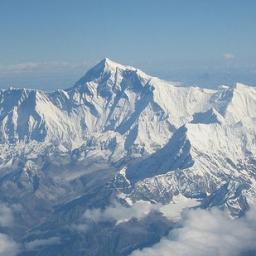Packing for two years, off the grid in the Himalayas...
 With a budget of just $1,200, and room for one carry-on and two check-in suitcases, both of no more than 60 kg (132 lbs), total, how would you prepare for living completely off-the-grid for two years in a remote village in the Himalayas?
With a budget of just $1,200, and room for one carry-on and two check-in suitcases, both of no more than 60 kg (132 lbs), total, how would you prepare for living completely off-the-grid for two years in a remote village in the Himalayas? That's the question asked by the Shortwave Listening Post, based on a user request, obviously with an intended focus on radio equipment and accessories. The necessities like food, shelter and warm clothing apparently being taken care of for you. Radio certainly would seem like the way to go for inexpensive entertainment and information in very remote areas, but answers that instead include satellite internet services (that stay within the budget with 2-years of service) could be equally interesting, if they are in fact available and practical.
http://swling.com/blog/2014/09/virtual-radio-challenge-ii-two-years-off-grid-in-the-himalayas/
I had to ask myself that very question when I joined a volunteer service that sent me to the wilds of rural Central America back in '98 (ie, sort of before the Internet was a thing). I brought a couple of toys to keep entertained - binoculars, bird books, guitar, some writing projects - plus a walkman, a dozen very carefully chosen cassettes, and a shortwave. To this day I like shortwave, but was starting to come to grips with the fact it's a largely dead medium. Even with a decent antenna these days I struggle to get much of anything better than evangelical preachers, China, some Arabic, and megahertz after megahertz of static. It's a wasteland out there even by the standards of 1998.
Went the other route then and got myself one of these this year. I love it, there's tons of stuff to listen to, and the reception is flawless until my wifi connection cuts out. That doesn't answer the question these guys are asking though.
Got to say I'd still bring the binocs, bird books, guitar, and a (reluctantly) a shortwave. I'd probably also bring a netbook and external harddrive, and hook myself up with a POP3 account and maybe an instance of leafnode running on the netbook, so I could sync mail and news. You're going back to the age of sporadic connections and doing most of your work offline, then uploading it. That said, the GSM revolution has made a lot of places phenomenally accessible all of a sudden, and I wouldn't be surprised if Nepal and the like have benefitted from it. I wrote this piece about my surprise at being able to connect to the internet from a remote location in the Sahel, and this piece called Life in 56K about how easy it is to live on low bandwidth.
As for these radio buffs obsessed with longevity, I'd simply use the money to buy a radio and two spares, a solar charger for double A batteries, and enough flannel to make them two or three little protective baggies. With the remaining money I'd purchase a two year supply of scotch, a couple cases of cigars, and enough weed to live well. Actually, sounds marginally better than my current lifestyle. I kind of feel when you're headed out to rural Bhutan, the question isn't how to maintain your current tech needs, it's how to adapt to a tech-free lifestyle. Bring a sack of books, some pens and notebooks for writing, aforementioned scotch, some star maps, and an open mind. Would be nice to not be glaring at the glowing, square screen for a while. Read some Peter Matthiessen to get into the spirit of zen-living.